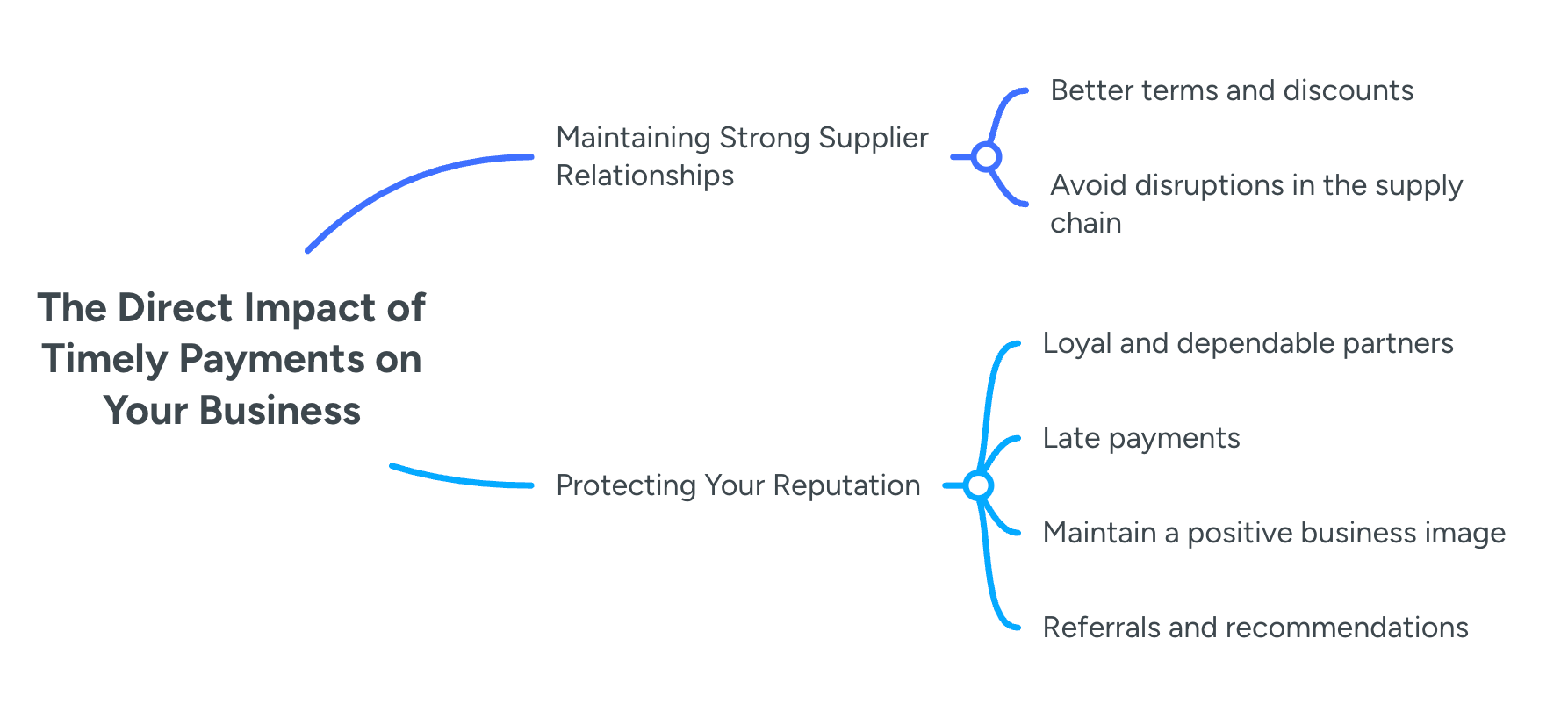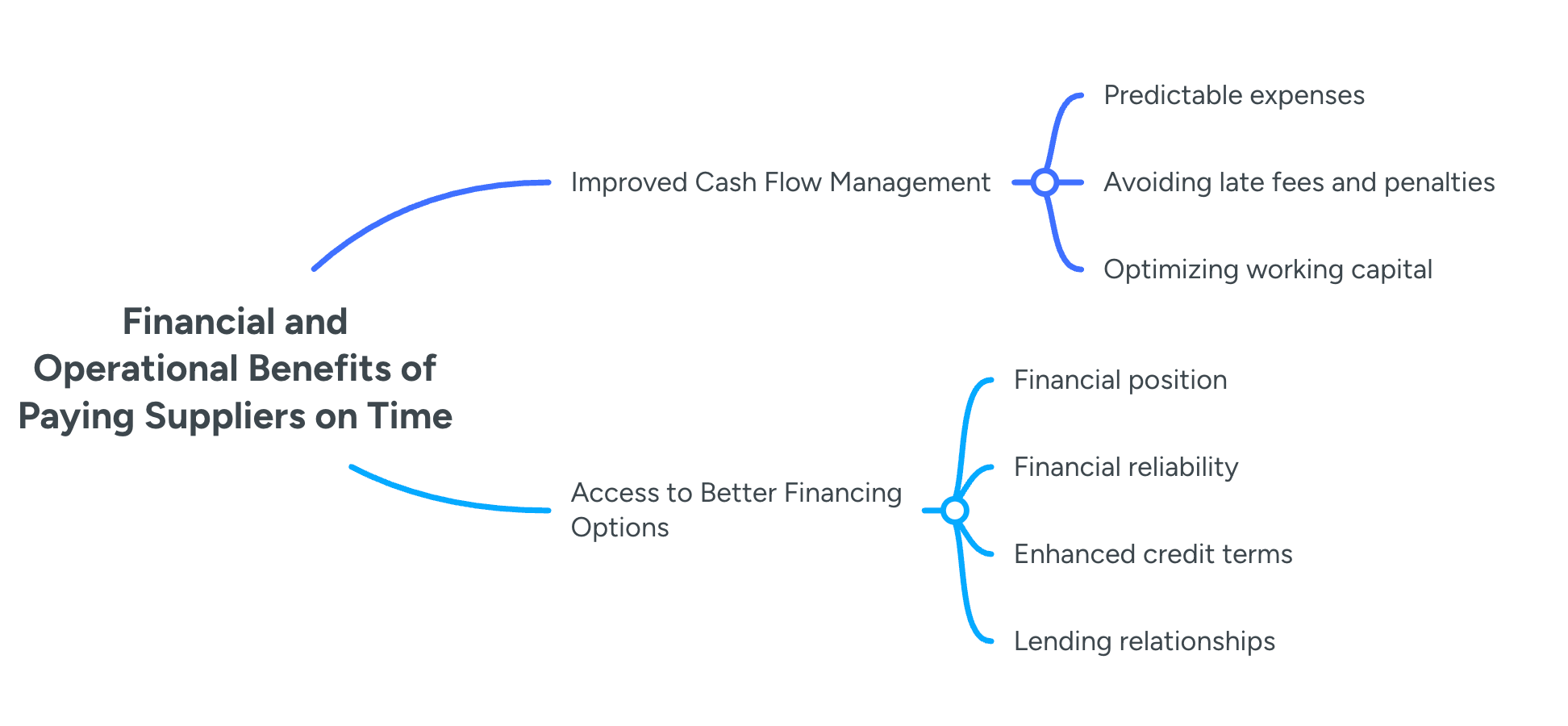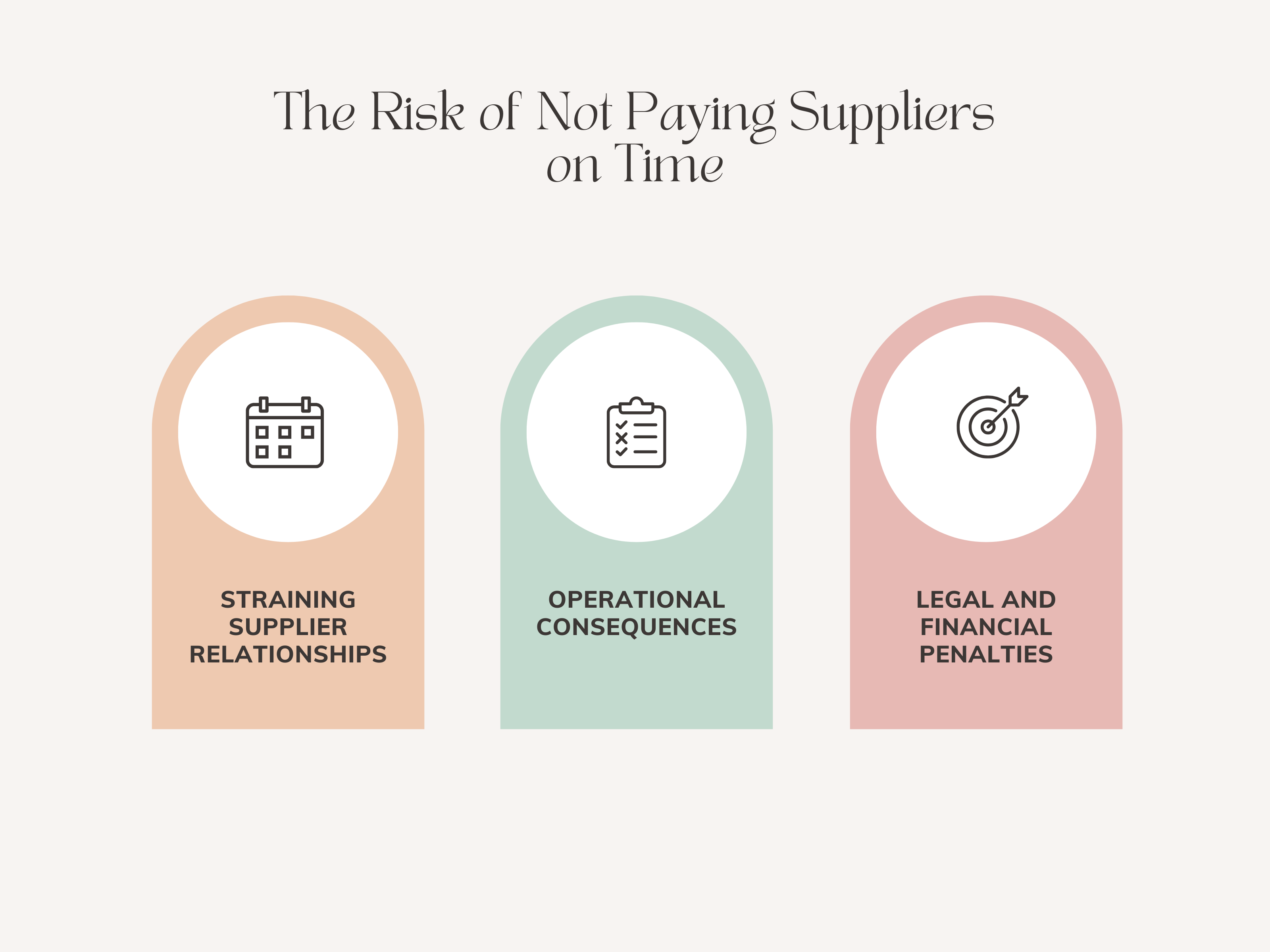Why You Should Always Pay Your Suppliers on Time?

Maintaining strong relationships with suppliers is crucial for sustained success. One of the simplest yet most impactful ways to ensure that these relationships remain positive is by paying your suppliers on time. Whether your business deals with one supplier or manages multiple contracts globally, timely payments play a key role in strengthening trust, securing favorable credit terms, and ensuring a smooth, uninterrupted flow of goods and services. Late payments, on the other hand, can lead to a myriad of operational, financial, and legal consequences that can strain business relationships and hinder overall performance.
This blog serves as a comprehensive guide on why paying your suppliers on time is essential for your business's growth and stability.
Table of Contents:
- The Direct Impact of Timely Payments on Your Business
- Financial and Operational Benefits of Paying Suppliers on Time
- The Risk of Not Paying Suppliers on Time
- How Timely Payments Affect Supplier Collaboration and Negotiations?
- Strategies for Ensuring Timely Payments
- The Role of Technology in Streamlining Supplier Payments
Jump to a section that interests you, or keep reading.
The Direct Impact of Timely Payments on Your Business

Maintaining Strong Supplier Relationships
Paying suppliers on time is essential for building trust and fostering long-term partnerships. When a business consistently meets its payment deadlines, it demonstrates reliability, which is highly valued by suppliers. This reliability strengthens the relationship, ensuring that suppliers are more willing to continue working with the business. As a result, a solid foundation of trust is established, which encourages both parties to collaborate more closely, share valuable insights, and explore new opportunities for growth.
One immediate benefit of timely payments is the potential for better terms and discounts. Suppliers are often willing to provide favorable payment conditions, such as early payment discounts or extended credit terms, to businesses that consistently meet their financial obligations. For instance, an early payment discount can lead to cost savings, which directly impact the bottom line. These incentives not only help businesses save money but also make them more competitive in the marketplace.
Timely payments also avoid disruptions in the supply chain, ensuring a steady flow of materials and services. Suppliers who receive payments on time are less likely to halt or delay deliveries, reducing the risk of operational disruptions. Unpaid debts can strain a supplier's resources, causing delays that ultimately affect the business's ability to meet its own customer demands. With timely payments, businesses can ensure that the supply chain remains uninterrupted, which is crucial for maintaining smooth operations and meeting customer expectations.
Protecting Your Reputation
A company’s reputation is directly influenced by its payment practices. Businesses that pay their suppliers on time are seen as loyal and dependable partners, making them a preferred choice for future engagements. Suppliers are more likely to prioritize customers who consistently honor payment terms, which can result in preferential treatment, such as expedited deliveries or access to higher-quality products. This kind of loyalty, fostered by regular, timely payments, can be a valuable asset, especially during times of high demand or tight supply chains.
In contrast, businesses that develop a reputation for late payments often face difficulties in securing favorable contracts with new suppliers. Suppliers may view these businesses as high-risk and, as a result, might offer less favorable payment terms or refuse to work with them altogether. A history of delayed payments can create long-term damage to a business's reputation within its industry, making it harder to negotiate future agreements or establish reliable partnerships.
Paying on time helps businesses maintain a positive business image, which plays a critical role in attracting new suppliers and clients. A solid reputation for honoring financial commitments enhances trust within the industry and can even lead to referrals and recommendations. Suppliers are more likely to share their positive experiences with others, providing word-of-mouth endorsements that open doors to new opportunities. Moreover, businesses with a good reputation for timely payments are often viewed more favorably by financial institutions, investors, and other stakeholders, which can be essential for securing financing or entering new markets.
Financial and Operational Benefits of Paying Suppliers on Time

Improved Cash Flow Management
Timely payments play a crucial role in maintaining predictable expenses for a business. By adhering to payment schedules, businesses can better forecast and plan for upcoming financial obligations. This predictability allows companies to manage their cash flow more effectively, ensuring that they have enough funds available to cover operating costs without facing unexpected cash shortages. Regular, timely payments provide a clear view of expenses, which helps businesses stay on top of their financial obligations and avoid unnecessary strain on their finances.
In addition, avoiding late fees and penalties is a significant advantage of paying suppliers on time. When payments are delayed, businesses may incur late fees or penalties, which can quickly add up and negatively impact cash flow. These additional charges not only increase the cost of doing business but also create financial strain, especially for companies with tight budgets. Late payments can also damage relationships with suppliers, leading to stricter terms in future dealings, including higher interest rates or the imposition of upfront payments. By paying on time, businesses can avoid these extra costs and maintain healthier financial standing.
Paying suppliers promptly also helps in optimizing working capital. Working capital is the capital available for day-to-day operations, and managing it efficiently is critical to a business’s financial health. When a business consistently pays on time, it can manage its cash flow with greater precision. This allows for better allocation of funds, freeing up capital that might otherwise be tied up in delayed payments or pending invoices. Efficient management of working capital not only improves operational efficiency but also helps businesses avoid borrowing money to cover cash shortages, thereby reducing interest expenses and improving overall profitability.
Access to Better Financing Options
Paying suppliers on time strengthens a company’s financial position, which is essential for securing better financing options in the future. A business that consistently meets its financial obligations builds a track record of financial reliability, which is viewed positively by both suppliers and lenders. Suppliers appreciate timely payments as it demonstrates a company's financial stability and commitment to its obligations. Financial institutions, on the other hand, look for businesses that can manage their finances effectively when considering loan or credit applications. A business with a history of on-time payments is seen as a lower-risk investment, which can lead to more favorable financing terms, such as lower interest rates or higher loan amounts.
Timely payment also leads to enhanced credit terms. Suppliers often reward businesses that pay on time with better credit terms, such as longer payment periods, higher credit limits, or even discounts for early payment. These benefits improve a business’s cash flow and can help to reduce operating costs. For example, a company that consistently pays its suppliers within the agreed terms may be offered longer payment cycles, allowing more time to generate revenue before settling debts. This flexibility provides businesses with more room to manage their expenses and reinvest in growth initiatives.
Moreover, businesses that maintain a strong payment history have an easier time building lending relationships with financial institutions. Banks and other lending organizations prefer businesses with a demonstrated ability to manage their finances responsibly. These institutions are more likely to offer loans, lines of credit, or other financial products to companies with a solid payment history, knowing they are less likely to default on their obligations. As a result, businesses with strong payment practices can access capital when needed to expand operations, invest in new projects, or weather economic downturns. This access to financing can be vital for companies looking to scale their operations, especially in competitive industries where timely investments can make a significant difference.
The Risk of Not Paying Suppliers on Time

Straining Supplier Relationships
Failing to pay suppliers on time can significantly damage trust between businesses and their suppliers. Timely payments are a key aspect of maintaining strong business relationships, and delays can quickly erode the mutual trust that has been built. Suppliers rely on timely payments to manage their own cash flow and operations. When payments are delayed, it can raise doubts about a business's financial stability or reliability, leading suppliers to question whether they want to continue working with that company. This breach in trust can make it harder to negotiate favorable terms in the future and may even result in the supplier reducing their level of service or ceasing to do business with the company altogether.
Moreover, late payments may result in reduced credit terms. Suppliers who have experienced delayed payments may respond by shortening payment periods or increasing interest rates on outstanding invoices. For businesses that rely on credit to manage their finances, this change can have significant consequences. Shortened credit terms force businesses to pay more quickly, while higher interest rates increase the cost of doing business. These changes can lead to financial strain and force companies to make adjustments to their payment strategies or cash flow management, potentially harming their bottom line.
Additionally, disruption of service can occur if a business fails to pay suppliers on time. Suppliers may decide to stop fulfilling orders or suspend services for companies with a history of poor payment practices. This disruption can have immediate consequences on business operations, causing delays in production or service delivery. In industries where suppliers are essential to maintaining operations, such disruptions can have a cascading effect on the entire supply chain, affecting customers, partners, and even the business's reputation.
Operational Consequences
Delays in supplier payments can lead to significant production delays. If a supplier withholds goods or services due to late payments, it directly impacts the business's ability to operate smoothly. For businesses involved in manufacturing or providing services that rely on a steady supply of materials or products, disruptions in the supply chain can halt production, leading to missed deadlines, frustrated customers, and ultimately lost revenue. Even a minor delay in receiving critical components can have a ripple effect on a business's operations, causing delays across various departments and functions.
The risk of stock shortages is another consequence of not paying suppliers on time. Maintaining a consistent flow of supplies is critical to preventing stockouts and ensuring that production or service delivery remains uninterrupted. Timely payments help to ensure that suppliers continue to provide the necessary goods and services without hesitation. However, late payments increase the likelihood of stockouts, which can lead to delays in fulfilling customer orders, missed sales opportunities, and reputational damage. For businesses that rely on just-in-time inventory models, the consequences of stock shortages can be especially severe.
Another operational issue that arises from late payments is the increased administrative burden. Delays often lead to follow-up calls, emails, and even disputes, consuming valuable time and resources that could be better spent on other tasks. Dealing with overdue payments can require significant administrative effort, such as reconciling accounts, negotiating with suppliers, or managing legal issues if the situation escalates. These activities not only drain time and resources but also divert attention from core business operations, reducing efficiency and increasing operational costs.
Legal and Financial Penalties
One of the most immediate consequences of not paying suppliers on time is the imposition of late fees. Suppliers often charge interest or penalties on overdue invoices, which can add up quickly, increasing the total amount owed. Late fees are a financial burden, adding unnecessary costs to a business's operating expenses. These fees can vary depending on the supplier’s terms, but even small charges can accumulate over time and affect the overall financial health of the company. Avoiding these penalties through timely payments is a straightforward way to keep operating costs under control.
In addition to late fees, businesses that consistently fail to pay on time may face more severe legal actions. Continued non-payment can lead to legal disputes, collection efforts, or even lawsuits, all of which can harm the business's reputation and financial stability. Suppliers may take legal action to recover outstanding debts, which can result in costly legal fees, negative publicity, and the diversion of resources from normal business activities. Furthermore, ongoing late payments can damage a company’s credit score, making it more difficult to secure financing or credit from other suppliers or financial institutions in the future. This can lead to higher borrowing costs, difficulty in obtaining necessary supplies, and an overall decrease in the business’s ability to operate efficiently.
How Timely Payments Affect Supplier Collaboration and Negotiations?
Better Negotiation Leverage
Timely payments provide businesses with significant negotiation leverage in supplier relationships. Suppliers value reliability and consistency, and paying invoices on time builds trust over the long term. This trust fosters long-term flexibility in negotiations, as suppliers are more inclined to accommodate businesses that they know are dependable with their payments. This trust can lead to suppliers being more open to adjusting terms or offering additional support, which can be beneficial for both parties.
One of the key benefits of paying on time is the opportunity for favorable pricing. Suppliers often extend better pricing to businesses with a strong track record of prompt payments. This can include discounted rates, reduced costs on large orders, or special offers that are not available to customers who are regularly late. Timely payments help businesses secure these pricing advantages, which directly impact profitability, particularly for companies with high purchase volumes or long-term supplier relationships. By establishing a reputation as a reliable payer, businesses can unlock better financial terms, contributing to overall cost savings.
In addition to better pricing, expedited deliveries are another benefit of consistent payments. Suppliers are more likely to prioritize businesses that settle their bills promptly, as this reflects well on their operational efficiency and reduces the risk of payment delays. When a supplier knows they can depend on timely payment, they may offer faster service or quicker delivery times to keep their reliable customers satisfied. This advantage is particularly critical for businesses that depend on just-in-time inventory or need quick restocking to meet customer demand. In such cases, maintaining a reliable payment schedule can ensure that operations remain smooth and that products or services are delivered as needed, without unnecessary delays.
Mutual Growth
Paying suppliers on time fosters win-win relationships that support mutual growth. When businesses honor payment terms, they contribute to the sustainability of the supplier’s operations, helping ensure they can continue providing quality goods and services. This creates a positive feedback loop where both parties benefit from the stability and reliability of their collaboration. As the supplier remains financially healthy, they are better equipped to deliver consistent service and improve their offerings, ultimately benefiting the business that pays on time.
Moreover, businesses that respect payment terms are in a better position to engage in collaborative opportunities. Suppliers who are confident in a business's financial reliability are more likely to consider joint ventures, collaborative projects, or promotional opportunities. These collaborative efforts can range from co-marketing initiatives to shared product development or exclusive product lines. Suppliers are more willing to invest in businesses they view as trustworthy and capable of following through on agreements, which can open the door to new business opportunities that might not be available to businesses with poor payment histories.
Strategies for Ensuring Timely Payments
Establish Clear Payment Terms
Establishing clear payment terms at the beginning of any supplier relationship is essential to ensuring timely payments. Clear terms set expectations for both parties, outlining when payments are due, any early payment discounts, and penalties for late payments. This clarity helps eliminate misunderstandings and provides a structured framework for managing financial obligations. It’s crucial that these terms are agreed upon upfront to avoid confusion down the line. Businesses should also ensure that these terms are clearly stated in contracts or purchase orders, which both the supplier and the business can refer to in case any discrepancies arise.
In addition to setting clear terms, it's important to track payment deadlines efficiently. Using tools like payment schedule management systems or reminder software ensures that deadlines are not overlooked. Many businesses use accounting or project management software to automatically track and alert them when payments are due. These tools not only ensure payments are made on time but also help businesses avoid late fees and maintain a strong financial reputation. By automating this aspect of payment management, companies can reduce the risk of human error and improve their overall cash flow management.
Automate Payment Processes
To streamline the payment process and ensure consistency, businesses should automate payment processes. Setting up automatic payments through methods like ACH transfers or credit card payments can significantly reduce the likelihood of late payments, especially in businesses with multiple suppliers. Automating the payment process ensures that funds are transferred promptly on the agreed-upon dates, eliminating the potential for oversight or delays due to human error. Furthermore, automated systems provide businesses with a transparent view of their payments, reducing the time spent manually processing payments and improving operational efficiency.
Leveraging accounting software like QuickBooks, Xero, or ERP systems can further enhance payment tracking and management. These tools can integrate with a company’s banking system, allowing businesses to automatically track outstanding invoices, payment due dates, and supplier-specific terms. Accounting software can also generate real-time reports that provide a comprehensive overview of a business’s financial obligations, enabling teams to stay ahead of payment schedules. By incorporating automation, businesses can maintain consistent cash flow and ensure suppliers are paid on time without having to manually process each transaction.
Negotiate Payment Terms That Work for Both Parties
Negotiating payment terms that work for both parties is an important strategy in ensuring timely payments. Flexibility is key when negotiating with suppliers, as businesses often have varying cash flow needs depending on the season or market conditions. A flexible agreement allows businesses to balance their payment obligations with their cash flow, ensuring they have enough liquidity while still meeting their supplier's needs. This flexibility can include negotiating longer payment terms, installment payments, or grace periods during particularly tight financial times.
Additionally, businesses should consider taking advantage of early payment discounts when negotiating terms. Many suppliers offer discounts for early payments, typically ranging from 1% to 3% for payments made within a set number of days, such as 10 or 15 days. By committing to pay early, businesses can lower overall costs and improve their relationships with suppliers. Early payment discounts also provide an opportunity for businesses to manage cash flow more effectively, especially during periods of financial stability. By carefully negotiating these terms, companies can create a more sustainable, mutually beneficial relationship with suppliers, leading to better service and possible preferential treatment down the line.
Build Strong Internal Processes
Building strong internal processes for managing accounts payable is critical to ensuring that payments are made on time. A dedicated accounts payable team can ensure that all payments are processed accurately and on schedule. This team should be tasked with managing supplier invoices, ensuring that payments are reviewed, approved, and executed in a timely manner. By having a team focused specifically on payments, businesses can reduce errors and delays that may arise from other departments being responsible for handling multiple tasks.
In addition to a dedicated team, businesses should review and streamline invoice approval workflows. Having a clear and efficient process for approving payments can minimize delays and confusion. When payment approvals are scattered across multiple individuals or departments, it can result in bottlenecks that push deadlines back. By establishing a centralized approval process and implementing defined steps for invoice review, businesses can reduce the risk of payments being held up. Automation tools integrated into the approval process can also enhance efficiency by flagging invoices that need attention and automatically routing them for approval.
The Role of Technology in Streamlining Supplier Payments
AP Automation Tools
Accounts payable (AP) automation tools have become crucial for businesses looking to streamline their supplier payment processes. These tools help reduce human error, minimize late payments, and improve overall operational efficiency. By automating the process of receiving, reviewing, and processing invoices, businesses can ensure that payments are both accurate and timely without requiring manual intervention for every step. AP automation significantly reduces the risk of overlooking payment deadlines, which in turn helps businesses maintain strong relationships with their suppliers and avoid penalties or interest charges for late payments.
In addition to improving accuracy, automation speeds up the payment process, allowing businesses to process a larger volume of invoices in less time. By eliminating the need for manual entry or approval steps, businesses can ensure that payments are made promptly, helping maintain a steady cash flow. Automation also improves visibility, providing real-time updates and reports on the status of all invoices and payments. This allows businesses to track their payment cycles, spot discrepancies, and make adjustments as needed to avoid any delays.
Payment Scheduling and Reminders
Payment scheduling and reminders play an essential role in ensuring that supplier payments are made on time. By setting up automated payment reminders, businesses can prevent accidental delays and ensure that all payments are processed by the agreed-upon deadlines. Payment alerts can be configured in accounting software, reminding businesses of upcoming due dates or approaching deadlines. These reminders can be set to notify accounts payable teams several days before the due date, ensuring they have ample time to process payments. Regular reminders help businesses stay on top of their obligations, reducing the risk of falling behind on payments and damaging supplier relationships.
Another key feature of modern accounting systems is the ability to schedule recurring payments for regular supplier invoices. For suppliers with consistent billing cycles, such as monthly subscriptions or ongoing service contracts, automated recurring payments ensure that invoices are paid on time, every time. By setting up recurring payments, businesses can eliminate the need for manual intervention each month, which not only saves time but also helps prevent the possibility of missing deadlines. Additionally, businesses can often take advantage of early payment discounts by setting up these automated payments, as invoices will be settled on the due date, or even early in some cases.
Conclusion
Paying your suppliers on time is much more than a simple financial transaction; it is a cornerstone of healthy business relationships and effective financial management. Timely payments directly impact your company’s ability to maintain a positive credit reputation, improve cash flow management, and access better financing options. By prioritizing on-time payments, you not only build trust with suppliers but also enhance your business's ability to operate smoothly, without disruption or delays.
The risks of not paying suppliers on time, such as damaged supplier relationships, operational delays, and legal penalties, are real and can significantly affect your bottom line. Fortunately, the advancement of automation tools and payment scheduling software has made it easier than ever to stay on top of your payment obligations. With the right systems in place, you can optimize your payment processes, avoid costly mistakes, and ensure that your business remains a reliable and trustworthy partner in the eyes of your suppliers.
